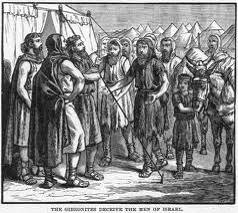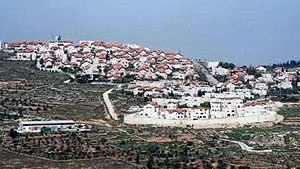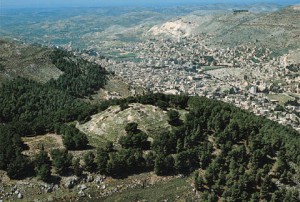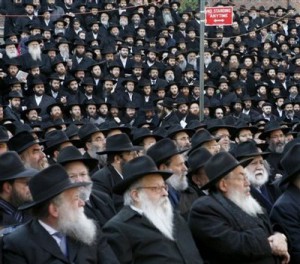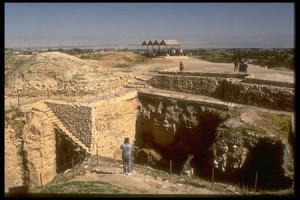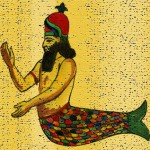
Introduction
Just why is Minor Thoughts your #1 source for the latest news and discussion concerning embattled Christian archaeologist Dr. Ron Charles, and his book The Search ? Is it our incisive reporting on the subject? Our delicate handling of the larger issues raised in indicting a fellow believer for his suspicious claims? Or perhaps just our marked determination, ironically so similar to that of a Christian archaeologist, to not stop digging until the truth is uncovered?
Probably not, as we haven't even mentioned the dude on our blog for years now. But we wish you'd tell us, because our original, off-handed mention that the guy's book is suspicious is still receiving replies. And recently a Mr. Richard Peck, who's co-authored an article on the subject of the man for Personal Freedom Outreach's journal, has offered me his research for the purpose of debunking Ron's claims. Other respondents include Dr. Ron Charles himself.
Who, I might add, I am personally starting to feel a little sorry for. This politico-religious blog calling him names now actually comes up first when you search him out on Google. For the longest time his own RonCharles.com _came in second, and now I can't find it at all. Meaning _we're actually the only real publicity this man has: a side-mention slamming his book as not worth finishing a couple years ago. We should start a charity to hire him an SEO writer.
Perhaps this visible position we hold at least explains why some, like commenter Flor Hull, angrily accuse us of acting as "Satan's helpers" for being so "stupid and naive [as] to spend all your time just [trying] to prove one man wrong." They assume that Webmaster Joe and I actually became the thorn in Ron Charles's side we apparently are through some sort of effort.
Allow me to dissuade all interested parties of that illusion. Joe and I have barely even spoken about Ron Charles. And so little patience for nonsense do I possess these days that I've lacked the constitution to even read more than a couple pages of Ron Charles's life's work at a time, so I certainly haven't let him unduly distract me. A few years ago I simply opened The Search, on the recommendation of a friend from whom I thankfully borrowed it instead of wasting my own money, read several of its ridiculous statements - all written in an amateurish style that assured me the author does not possess a professor's education, regardless of the bio in the back - and then I put it back down. Out of a sense of civic duty I typed out a quick form letter of protest to the people at Final Frontiers dumb enough to hire such a person.
That's been the extent of my personal investment in the issue. Frankly, the Church and the religious world in general possesses no shortage of crackpots pedaling obviously ridiculous theories to the gullible - I just finished reading Tim LaHaye's (Left Behind) guide to the Book of Revelation, incidentally - and Ron's a pretty small fish, all things considered.
Yet the case was recently made to me that whereas I have often said that the only credible role of the blog-o-sphere is to provide commentary not currently available in the mainstream media, and whereas no resource currently exists on the internet for people at risk of being fooled by Ron Charles's absurd "findings", writing an actual article on the question of Ron Charles's book and creditability would provide an authentic service. After all, "small fish" are exactly what blogs are best at catching.
So I caved in, and I wrote this.
I thank Mr. Richard Peck and Personal Freedom Outreach, who graciously allowed me to use research from their own article on the matter ("The Search for the Real Dr. Ron Charles") from the July-September '08 issue of PFO's Quarterly Journal. If you want more information, go buy a copy.
Who is Dr. Ron Charles?
Ronal D. Charles is a man who has written a book about his personal search ("a culmination of more than 30 years of historical research") for information on Jesus Christ - aptly titled The Search. You can buy it on Amazon. Apparently some people do. As of this writing all of the reviewers have given it perfect scores, too, though at least some of these people are known to be personal friends of Mr. Charles.
When I received his book from a friend, I first opened it to its back page. Since I'd never heard of Ron Charles, I wanted to know who he was. Here was the information I found:
"Dr. Ron Charles is well qualified [sic] to write a book about the search for historical Jesus... [He has] a B.A. in Theology... an M.A. in Ancient History, an M.A. in Historical Theology, a Ph.D. in Ancient History, a Ph.D. in International Relations, and a Th.D. in Historical Theology... He serves on the Board of Directors for Pacific International University... as a member of the Board of Governors of Cambridge's Biographical and Historical Division, and has recently been a recipient of Cambridge's One Thousand Great Americas[sic] award. Dr. Charles has Mitten [sic - surely he means "mitted". What a multi-talented man!] six other books."
Note that I've just quoted only a little of The Search so far and have already had to note two mistakes. There are three paragraphs total within the "About the Author" section and they contain several more mistakes, run-on sentences and the like. For me, this is what immediately flagged Ron Charles's book as not to be trusted. Any man capable of earning doctorates in multiple subjects shouldn't write on a high school student's level. In fact, he almost certainly would be capable of getting his work published by a university press or other book publisher, instead of having to self-publish (not that I have anything against self-publishing - some great books have been self-published - but you should note when one is).
I didn't follow up on Ron Charles's biography then. I just flipped to the front of the book and began reading. But recently I've come back and taken a second look at this section, bothered to check a few of the credits listed. I'd never heard of Pacific International University but simply assumed it was a credible institution.
Not so. Pacific International University is apparently what's sometimes called a "diploma mill", according to the Council for Higher Education Accreditation. No institution respectable enough to meet the standards of the Department of Education or the Council for Higher Education considers P.I.C.'s degrees to be worth anything. In some states it would even be fraudulent to suggest so. Which makes one wonder how many of Ron Charles's degrees are from its printer or that of a similar (let's call it what it is) business.
Let me quench one's curiosity. Richard Peck's article for PFO's Quarterly Journal details at least three such degrees, all obtained via "home-correspondence courses" from Florida International University: a B.A. in Theology, a master's in Biblical History, and a doctorate in Biblical History. And all obtained within a three-year span! No easy feat, unless of course it was.
Richard Peck also notes many other degrees Ron Charles has allegedly claimed to hold, but which on review he doesn't: theological degrees from actual respected academies like Berean University, U. of Southwestern Louisiana, Kilgore College, and - get this - Cambridge University. No less than honorary PhDs from that last one too, though it's news across the pond.
If this is true, who is "Dr." Ron Charles? I certainly couldn't tell you, but apparently not someone "well qualified" to write a book about Jesus.
A Look Into Ron Charles's The Search
The shortcomings of its author aside, let's consider Ron Charles's magnum opus on its own merits. Now, I've admitted to having not read the entirety of The Search - just the first few chapters on several occasions and a few random selections from the tome's innards. Factor that as you will into your estimation of my opinion on it, but life is short and we are all stewards of the time we are given on Earth. I don't think reading all of The Search is good use of it. Nor do I really think it's necessary when what I have read of it is so dubious.
Ron Charles has written in our comment threads that "within the body and text of [The Search] I have identified each and every manuscript that I used. I name the museum, the university, or institution where the document can be found (in case someone wants to also research the documentation), the author, the date that it was written and exactly where it is located in the institution. I researched for over 30 years; traveling to over 50 countries in that research and it took me 3 years to write it."
(An aside: Whoa. Three years. That's as long as it takes to get three degrees!)
Poppycock. "Identified each and every manuscript that I used"? On pages 226-235 he claims to have discovered ancient scrolls in the possession of a mullah in Turkey, documents illuminating much about the wedding feast in Cana described within the Gospel of John, including who's wedding it actually was (Jesus' sister). After reading these scrolls with understandably breathless excitement - this is the kind of find deserving cover treatment by every Biblical archaeology magazine in print, the kind of find which makes a scholar's legacy - what does Ron do? Plead with the mullah to entrust the document to a museum? Photograph it? Return later with a renowned professor to authenticate it, followed by a team to excavate the area in which the scroll was found? Trade the mullah his scrolls for a briefcase of laundered cash? Surely something! After all, this is the sort of revelation that would bring a grinding halt to any previous investigation and consume all further attention.
Well, sorry to disappoint you. He leaves and The Search doesn't bother mentioning them again, even though these scrolls (if they really exist) are worth a few dozen dessertations in and of themselves. And where can a reader go and investigate these scrolls for himself? He or she can go to Amad's house in Hatay, Turkey, that's where. Or maybe it's "Amada's" house. I'm not sure because neither is Ron Charles. He can't seem to remember the name of the man with whom he shared this transformative experience. For half the story he spells it one way and half the time he spells it the other (for which I again do have sympathy, since I honestly make the same mistake on a regular basis. When I'm writing fiction).
Anyhow, the name's not important. If you want to find the man, you can identify him because he's the mullah of a mosque that, er... used to be named the Church of St. Barnabas. Ask around town 'til someone's eyes light up.
Another weakness of this story is worth mentioning for what it says about either the character of Ron Charles or the extent of his education: Ron's unquestioning acceptance of these long-lost sheepskin scrolls at face value. Even if the documents truly are real and are old, instead of fakes sold by a native to unsuspecting tourists, Ron's education should tell him that spurious additions to the story of Jesus' life were (and are) a dime-a-dozen. We have tons of ancient reports like these scrolls in the possession of universities, pretending to be evidence of new details about the life of the Christ. In fact, some of these fake additions have made it into the Bible itself (Did you know that the story of Jesus sparing the prostitute from stoning is nowhere to be found in our best and oldest manuscripts?).
But Ron Charles is a very trusting man. He leaves Amad's/Amada's house a true believer. "In one short afternoon," he writes on page 235, "I had learned that the wedding at Cana was probably Jesus' sister's wedding, Mary was the sponsor of the wedding, there were two different types of wine served, Mary's wine-order had been "short-changed," [sic] Jesus was responsible for giving a benediction at the wedding" and much, much more.
I am not so trusting a man. You, Dear Reader, should not be one either.
There are plenty of similar examples within The Search, if you care to read the other 600 pages. Experts you don't know authoritatively produce information of which respectable Bible professors I know have never heard. Untitled documents are found in libraries. Really, it's all not unlike The Da Vinci Code, only purporting to be real and without a set of antagonists nipping at Ron Charles's heels (though he's got 'em now). As with any fantasy, you read until you feel your suspension of disbelief break.
The Questions
Mine are obvious, so let's answer everyone else's.
In his comment on our original mention of him, Ron Charles asked me a question: "How does your opinion about the book translate into a personal evaluation of my character?"
It's really quite simple. A person can deduce a lot about the person who made a product from the product itself. When I read a book in which patently absurd claims are made without any back-up, I swiftly come to the conclusion that the man who produced it is not trustworthy.
He also protests: "What kind of con am I running? When I am in the USA I make people aware of the conditions of the persecuted Christians in the Muslim Middle East. Check with Final Frontiers, they are missing no money, I have not beat them out of anything. In fact, all funds that I make from my book and speaking goes to feed the persecuted Christians in the Middle East. Is that a con?"
If you're selling nonsense, yes it is, regardless of why you do it - and frankly, considering how untrustworthy his book is, I'm not willing to take Ron Charles' charity at face value either.
A gentleman named John Rose also made this pertinent inquiry: "Let me be clear with one thing at the very onset. 'IT TAKES ONE TO KNOW ONE.' The people who are slandering Mr. Ron Charles should be aware of this. What are their own credentials to discredit Ron?"
The initial reply that comes to my mind is that I am actually "well qualified" to discredit Ron, having myself received a four-year degree at an accredited institution - but really, it's even more basic than that. I'm simply a person with a capacity for some level of critical analysis. If you're one too, you probably didn't need to read this article; you quickly noticed the problems with Ron Charles and his book, then moved on.
Many people don't have that ability, however. They're the ones on whom people like Ron Charles - or to throw out another example, Jason Gastrich - prey, and the Church is full of them, since most believers have almost by definition eschewed their critical faculties in favor of simply believing what they are told (consider their general willingness to believe the Gospel of Matthew correctly cites his Old Testament sources, when all any Christian has to do to see the writer is pulling a serious Michael Moore on them is flip to those parts of the Bible) Thus do hucksters flourish there, spinning tales of having discovered surviving dinosaurs in the Congo, the Ark in the Turkish mountains, the ovens of Nebuchadnezzar in the ruins of Babylon, or anything else. They know that most of their audience will believe without question, desperate as they are to have their world view corroborated by external evidence.
I know of what I speak. I can still remember the seminars to which my parents brought me when I was a junior Baptist in Norfolk. Boy, did I eat it up.
Which brings me back to one of our commenters' questions: when most Christians are so incurious about the truth, are we just what Flor Hull said? Are we stupid and naive for trying to prove one man wrong? After all, it's clear that Ron Charles and his kind are all symptoms of what's wrong with the body of Christ rather than what ails it.
Updates and Links
-
Jamaica Gleaner News has an interview with Ron Charles up on its website in which our dear evangelist is said to have discovered Noah's Ark - and as far back as 1991, no less. Strange that nobody's updated its Wikipedia entry yet.
-
Enjoyably, another webpage has Ron Charles debunking someone else's same claim.
-
A commenter has offered us the current webpage of Ron Charles. Here's the link. It's quite the brazen man who can declare his intent to "provide the highest quality of educational truth" to Third World peoples while on the same page lying that his books have hit the New York Times Bestseller List. Interestingly, he claims to be the author of not just The Search but also "many books on history, theology and archaeology, some [sic] have been on N.Y. Times best seller list." More drivel, or is anyone else aware of other books published by Ron Charles?
-
The Midland Reporter-Telegram's website MyWestTexas.com has a full article about Ron Charles in advance of his September 15th guest spot on God's Learning Channel (which was just last night, as of this writing). The story pimps Charles's Cubit Foundation and also has a slightly less absolute declaration by Charles about his relationship with Noah's Ark: “What we can say is there was an object up [on Mt. Ararat] made out of wood that fits the same dimensions as the Bible... It very well could be.”
-
Ron Charles is a "featured scholar" on Truths That Transform: A Reliable Source, a DVD that "provides myth-busting evidence which validates God's Word". Coral Ridge Ministries sells 'em here. One can only assume the product's subtitle refers to the Bible and not the documentary itself.
Notes
Charles, Ron. The Search. Bloomington, Ind.: 1st Books Library (AuthorHouse), 2007.
Richard Peck and G. Richard Fisher. "The Search for the Real Dr. Ron Charles." The Quarterly Journal. 28. 3 (2008): 5-8.


